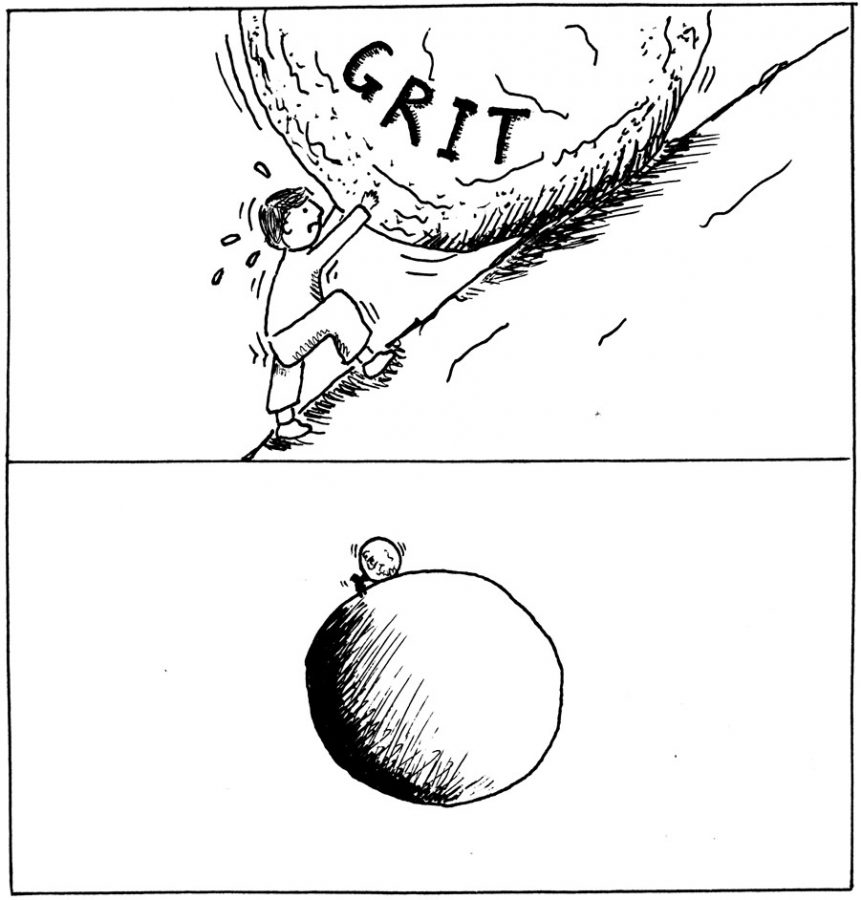Halloran: ‘Grit’ overrated as a secret to success
May 27, 2016
In 2013, psychologist Angela Duckworth delivered a powerful TED talk on the importance of “grit,” or outstanding ability to persevere through failure, as a predictor of success. Duckworth claimed that, in her studies, she had found the key “wasn’t social intelligence. It wasn’t good looks, physical health, and it wasn’t IQ. It was grit.” However, Duckworth’s findings have recently been questioned by Marcus Crede, a psychologist at Iowa State University. Besides calling out the legitimacy of Duckworth’s sample size for her study, Crede suggests that grit is not quite as decisive a secret to success.
I agree with Crede that Duckworth’s findings are nowhere near revolutionary. As long as I can remember, grit has been one of the primary skills that schools have attempted to instill in their students. I am grateful that my education has taught me to set and persist toward goals, but it can just as easily be argued that this insistence on making all children grit-oriented results in widespread burnout.
I have “grit” to thank for most of my successes. Without four years of hard, grinding work in high school, I never would have gained acceptance to Northwestern. Yet for nearly the entirety of my high school career, I was profoundly unhappy; I worked myself so hard that I often found myself physically ill. Still, I would have been one of Duckworth’s success stories. Nor was grit my only beneficial trait. Since I was placed in gifted programs from a young age, I had access to opportunities that other students, some of whom I’m sure deserved them more, did not. I worked, commonly to the point of exhaustion, for what I had. But, even in public schools, I was set up for success.
Why do we insist on quantifying success in such a limited, myopic way? Not every child has to, or, more importantly, wants to, win the spelling bee. Crede makes an important point that grit is “strongly correlated with conscientiousness,” a nearly-immutable personality trait that is already well-known to psychologists. In other words, some children have it; others don’t. Forcing everyone to operate in the same way ruins school for people who are wired differently.

Lisa Chen/The Daily Northwestern
In fact, emphasis on “grit” is not only detrimental to those who aren’t grinders, but is also borderline ableist. Much is made of CEOs with dyslexia — Malcolm Gladwell dedicates an entire chapter of his book “David and Goliath” to this topic — but does not sufficiently consider how much harder children with learning disabilities must work to achieve the same level of success as their neurotypical peers. Millions of children with dyslexia don’t become CEOs or underachieve relative to their classmates. Are these children all simply lacking in grit?
Even worse, people who become consumed by displaying their dedication to work often struggle to adjust their approach. People’s interests evolve over time, but people are understandably reluctant to change paths after investing an inordinate amount of time on a singular task. As a result, many gritty people are left pursuing careers and fields of study for which their passion is long gone. Ironically, Duckworth herself has changed careers twice — initially a management consultant, she became a teacher, then a psychologist.
Many of the “gritty” aren’t even fond of grit. Constant hard work is, of course, productive, but can be extremely taxing both mentally and physically. It is certainly important to teach children to persist. However, the grit mindset encourages not so much a fear of failure as an attempted avoidance of it. Students will work themselves to death in a field in which they are sure of their competency, rather than challenging themselves by exploring their interests. Not everyone can, or will, or should work this way. The fact is giving up is OK. There is no shame in doing things a little slower, allowing yourself free time, or changing your major. This obsession with “grit” is unhealthy and discourages creativity — we might want to consider focus on de-emphasizing “grit” to young overachievers.
Sara Halloran is a Weinberg sophomore. She can be contacted at [email protected]. If you would like to respond publicly to this column, send a Letter to the Editor to [email protected]. The views expressed in this piece do not necessarily reflect the views of all staff members of The Daily Northwestern.


